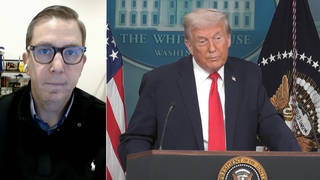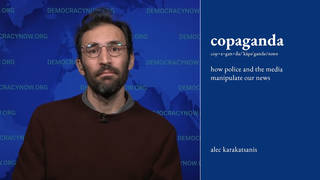
The Supreme Court heard oral arguments this week in a case challenging President Donald Trump’s tariffs, with plaintiffs arguing that his unilateral levies on imported goods violate the Constitution, which grants Congress the power to impose taxes and regulate foreign commerce. The Trump administration has justified his unprecedented use of tariffs under a 1977 law known as the International Emergency Economic Powers Act, but several justices seemed highly skeptical of that argument, potentially putting President Trump’s signature economic policy at risk.
“There is no genuine emergency. There is no war that is the precipitating basis for invoking IEEPA. And even if it were, it would not allow the imposition of tariffs,” says legal expert Lisa Graves, founder of True North Research and co-host of the podcast Legal AF.
Graves also discusses her new book, Without Precedent: How Chief Justice Roberts and His Accomplices Rewrote the Constitution and Dismantled Our Rights.
Transcript
AMY GOODMAN: This is Democracy Now!, democracynow.org. I’m Amy Goodman.
We’re staying on the subject of the Supreme Court but now turning to a major case before the court on President Trump’s authority to impose sweeping tariffs on foreign goods. The court heard oral arguments on Wednesday. Solicitor General John Sauer argued President Trump has the power to unilaterally impose the tariffs under a 1977 law known as the International Emergency Economic Powers Act, or IEEPA, which grants the president the authority to regulate commerce during wartime or other national emergencies. This is the solicitor general arguing.
JOHN SAUER: I want to make a very important distinction here. We don’t contend that what’s being exercised here is the power to tax. It’s the power to regulate foreign commerce. These are regulatory tariffs. They are not revenue-raising tariffs. The fact that they raise revenue is only incidental. The tariffs would be most effective, so to speak, if no — no — no person ever paid them.
AMY GOODMAN: Challenging the policy in the case is a group of small businesses. This is the plaintiffs’ attorney and former solicitor general, Neal Katyal, speaking outside the court.
NEAL KATYAL: Our message today is simple: The Constitution, our framers, 238 years of American history all say only Congress has the power to impose tariffs on the American people. And tariffs are nothing but taxes on the American people, paid by Americans. This case is not about the president; it’s about the presidency. It’s not about partisanship; it’s about principle. And above all, it’s about upholding the majestic separation of powers laced into our Constitution that is the foundation for our government. We thank the justices today for their extensive questioning in this case, and we look forward to the resolution.
AMY GOODMAN: The case has moved quickly through the federal courts. The court has heard roughly two dozen emergency appeals by the Trump administration, which the conservative majority has largely allowed Trump’s aggressive agenda to go forward. But this is the first time the court will make a final decision on one of those policies. On Wednesday, the justices, including conservative justices, appeared skeptical of the government’s argument. This is Chief Justice John Roberts.
CHIEF JUSTICE JOHN ROBERTS: You have a claim source, an IEEPA, that had never before been used to justify tariffs. No one has argued that it does until this, this particular case. Congress uses tariffs and other provisions, but — but not here. And yet — and correct me on this if I’m not right about it — the justification is being used for a power to impose tariffs on any product, from any country, for — in any amount, for any length of time. That seems like — I’m not suggesting it’s not there, but it does seem like that’s major authority, and the basis for the claim seems to be a misfit.
AMY GOODMAN: For more on tariffs and the Supreme Court, we’re joined by Lisa Graves. She is the director and founder of the policy research group True North Research. Her new book is titled Without Precedent: How Chief Justice Roberts and His Accomplices Rewrote the Constitution and Dismantled Our Rights. She’s also the former deputy assistant attorney general. And she’s joining us now from Superior, Wisconsin.
Welcome back to Democracy Now!, Lisa. So, in fact, the chief justice is the main focus of your book on the Supreme Court. Talk about the significance of this case. And did it surprise you, the skepticism of the conservative majority, including the three Trump appointees?
LISA GRAVES: Well, this is an important case. And I wish that I could have confidence in the — I suppose, the sincerity of those questions that John Roberts posed, but we know that just last year he invented immunity from criminal prosecution for a president, for President Trump, out of whole cloth, despite the fact that the Constitution does not provide that power. So, now here we are, over a year later, with this court deciding whether this president has the power to engage in tariffs, even though the Constitution expressly gives those powers to Congress. And this law, IEEPA, does not provide any tariff power to the president.
And as you know and your listeners know, tariffs are taxes that end up being paid by the American people in the costs of the goods that we ultimately purchase. And Trump has bragged about how these tariffs are supposedly producing so much revenue, billions and billions of dollars of revenue, and yet we had the administration argue before the court that the revenue was incidental, that this is just a normal regulatory power. It’s not. Nothing’s normal.
I do think this court, the Roberts Court, is going to strike this down, but that’s in part because this court, you know, occasionally will rule against this president. But as you note and noted at the top of this show, 24 times so far this year, this court has intervened to allow reckless and damaging actions to happen to the American people, irreparable harm on the American people. And in this instance, with the business community weighing in, perhaps it will decide against Trump this one time, and then try to use that as a shield to say, “Look, it’s fair,” when in fact this court, under John Roberts, has behaved in innumerable ways, in very unfair ways, in counter-constitutional ways and in ways that have decimated our rights, including our voting rights.
AMY GOODMAN: So, talk about who actually brought this case. The businesses are not corporate giants. They’re small and medium-sized. And when you say everyone knows that these are taxes, explain more fully who pays these tariffs, as President Trump says, you know, “We’re going to get these countries to pay.” That’s not, in fact, who pays.
LISA GRAVES: Yeah, that’s not who pays. So, the tariffs are tariffs on goods sold in the United States, imported in the United States, which means, ultimately, whether it’s businesses buying those goods as components for building products or whether it’s consumers buying things at the grocery store or a department store, it’s the American people who pays. Right now some of the businesses that are involved in these — in imports are not passing those tariffs on to the American consumers. They’re waiting to see what ultimately happens and absorbing those costs. But those costs are already being passed on to the American consumers in lots of ways. And so, it is — this idea that this is some sort of non or revenue incidental tariff, that it’s supposedly foreign-facing so it doesn’t affect us, that’s not true. It’s we, the American people, who ultimately pay the cost of those tariffs.
And Congress has the power to tax. Expressly, in the Constitution, it’s given to it, not the president. And simultaneously, in that same provision, Congress is given the power to impose tariffs. This statute that the Trump administration is hanging its hat on does not give the president the power to tariff or to tax. And there’s a good reason for that. It’s not just that it’s in our Constitution. Trump’s behavior is exactly why no president has ever been given this sort of power, because putting that power in the hands of one person allows for arbitrary, capricious, whimsical, vindictive action by one person, as we’ve seen Trump do. That initial round of tariffs was announced as including tariffs on Penguin Islands, but not North Korea and Russia. The tariffs are arbitrary. We’re seeing sort of a shakedown process in some of the efforts to try to get countries to appease Trump’s ego in exchange for dropping tariffs or limiting them. That’s not how tariff policy is supposed to go. It’s supposed to be passed by Congress through genuine deliberation. And more than that, because it’s a tax on the American people, it has to be something that only Congress can do, because Congress has the power of the purse, not the president. And we cannot have this president, you know, exercising all the powers, basically, of the legislative branch and the executive branch.
AMY GOODMAN: This is an exchange between Justice Elena Kagan and the Solicitor General John Sauer during oral arguments, speaking about emergency powers.
JOHN SAUER: The president has to make a formal declaration of a national emergency, which subjects him to particularly intensive oversight by Congress, repeated — you know, natural lapsing, repeated review, reports and so forth, that says you have to consult with Congress to the maximum extent possible.
JUSTICE ELENA KAGAN: I mean, you, yourself, think that the declaration of emergency is unreviewable. And even if it’s not unreviewable, it’s, of course, the kind of determination that this court would grant considerable deference to the — to the president on. So that doesn’t seem like much of a constraint.
JOHN SAUER: But it is a constraint.
JUSTICE ELENA KAGAN: And, in fact, you know, we’ve had cases recently which deals with the president’s emergency powers, and it turns out we’re in emergencies everything all the time about like half the world.
AMY GOODMAN: English, please, Lisa Graves.
LISA GRAVES: Well, so, this question under IEEPA is whether there is an emergency that’s the basis for regulation or sort of an embargo. And in this instance, there isn’t. The administration has claimed that the fentanyl crisis somehow allows it to impose these wide and arbitrary tariffs. It’s also claimed that the trade deficit, which has been part of our, you know, economy for decades, is some sort of national emergency. It’s not. We’ve seen Trump assert emergencies in Portland, in Los Angeles. Like, he basically just uses the word “emergency” to try to get away with anything.
And it is true, the Supreme Court has traditionally deferred to declarations of emergencies by presidents. But I don’t think it has any obligation to defer to this president’s claims of emergency, which are factless, which are baseless, and which are just another argument, the kind of argument John — that John Sauer tends to make in justification of his client getting to do whatever he wants. So, there is no genuine emergency. There is no war that is the precipitating basis for invoking IEEPA. And even if it were, it would not allow the imposition of tariffs.
AMY GOODMAN: So, Lisa Graves, you’ve written this new book. It’s called Without Precedent: How Chief Justice Roberts and His Accomplices Rewrote the Constitution and Dismantled Our Rights. If you can talk more about the major points in this book, as you specifically look at Chief Justice Roberts? Start with the whole issue of the Voting Rights Act. Talk about Chief Justice John Roberts’ origin story.
LISA GRAVES: Yes. So, John Roberts chose to clerk for Bill Rehnquist, who was one of the most notorious anti-voting rights people on the Supreme Court. He, in his personal capacity, sought to make it harder for Arizonans to vote, targeting Black communities in Arizona with voter suppression, himself personally, in Bethune, in the neighborhood of Bethune. Then, when he was on the court, right before John Roberts joined him, he issued a decision, the first decision trying to cut back Section 2 of the Voting Rights Act, to say that effects would not count.
So, then what happened was, Bill Rehnquist called Ken Starr, who was then the chief of staff for the new attorney general for Ronald Reagan, and urged him to hire John Roberts. John Roberts was hired by the Reagan administration and put in charge of voting rights. John Roberts had no experience in voting rights, no experience in litigation. The only experience he had was clerking for — basically, stodging for — the most regressive justice on Supreme Court when it came to voting rights. Rehnquist, by the way, actually urged that his justice he clerked for dissent from the Brown v. Board of Education decision. Rehnquist aided Barry Goldwater, the guy who — one of the, you know, senators who opposed the Civil Rights Act.
So, this is the origin story of John Roberts. He spent hundreds of hours trying to block Congress from repairing that, from overturning that ruling. And then, the Voting Rights Act was extended for more than 20 years, into 2007, and then, when John Roberts became the chief justice of the United States in 2005, as soon as there was a case teed up for him to do so, in the Shelby County case, he ruled against the Voting Rights Act. He struck down other key enforcement provisions of the Voting Rights Act, Section 4 and Section 5, that required preclearance of changes in jurisdictions that had a history of voter suppression or history of targeting Black voters. And that Shelby County decision unleashed this wave of voter suppression and voter restriction we’ve seen over the past decade. And now, right now, this court, the Roberts Court, is considering overruling Section 2 of the Voting Rights Act and allowing white-majority legislatures to dilute the Black vote in Louisiana and other states.
AMY GOODMAN: We’re talking to Lisa Graves. Her new book is just out. It’s called Without Precedent: How Chief Justice Roberts and His Accomplices Rewrote the Constitution and Dismantled Our Rights. As you observe this court right now, what are your biggest concerns? And how do the other justices feel about the chief justice?
LISA GRAVES: Well, I think this court is behaving illegitimately. These emergency orders overturning the well-reasoned, factually founded, legally grounded decisions to impose temporary restraining orders in the face of unilateral, extreme actions by this president, where the plaintiffs have shown irreparable harm, these are illegitimate actions by this court basically to aid Donald Trump. And it’s part two of what it did last year in effectively pardoning Donald Trump, preventing the trial, the trial around January 6th, to go forward, and basically paving the way for his return to power. And now, once in power, John Roberts has helped to empower Donald Trump further with the help of his fellow Republican appointees.
I think the Democratic appointees to the court, in the minority, are very frustrated, as you can see from the dissents in these cases, where the court is not describing why it is overturning these lower court rulings and allowing Trump to put his foot on the gas pedal to go forward with them while people are being harmed every day.
I think that this Roberts Court is out of control. It’s behaving arrogantly. It has aggressively intervened in those cases, just like with the immunity decision. It could have let the lower court rulings, which were based on well-grounded precedent, stand, but instead it has sought to aid Trump at almost every turn and, in doing so, has exposed itself as a hyperpartisan court that isn’t really behaving like a court but is behaving like an arm of the MAGA Trump presidency.
AMY GOODMAN: What most surprised you in doing the research for your book?
LISA GRAVES: Oh my goodness. Well, it was a small thing. But, you know, everyone knows that John Roberts talked about how he was going to be a fair umpire just calling balls and strikes. When I looked into his background, it turned out that he never played baseball in high school or college. He was actually a football player. And his coach told a right-wing dark money group that helped support his confirmation that John Roberts was particularly skilled as a tackler, as someone who studied his opponents and sought to find out ways to tackle them. That’s who we really have at the helm of the Supreme Court, is a player on the field who’s moving that right-wing, regressive, Reagan revolutionary agenda forward, not the fair umpire that he claimed to be and that he sought to put — plant into the American people’s minds as who he is. He’s not that umpire. I’ve actually decided to call him a “Trumpire,” because he’s been so willing to help Trump in almost every way as he expands the presidency far more than any other president has had such power. And in fact, that ruling really took out one of the key pillars of the checks and balances in our democracy, making the oath that John Roberts administered to Donald Trump, that he would faithfully execute the law, almost meaningless.
AMY GOODMAN: Lisa Graves, I want to thank you for being with us, director and founder of the policy research group True North Research. Her new book, Without Precedent: How Chief Justice Roberts and His Accomplices Rewrote the Constitution and Dismantled Our Rights. She was speaking to us from Superior, Wisconsin.
Coming up, as the U.S. blows up another boat in the Caribbean and considers assassinating the Venezuelan president, we’ll speak to Peter Kornbluh of the National Security Archive. Stay with us.
[break]
AMY GOODMAN: “Tiempos de Amor,” “Times of Love” by Las Cafeteras, here at our Democracy Now! studio.













Media Options